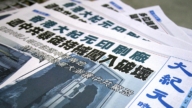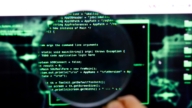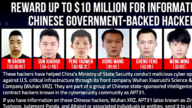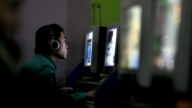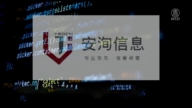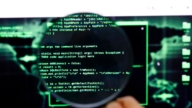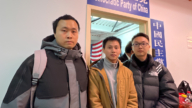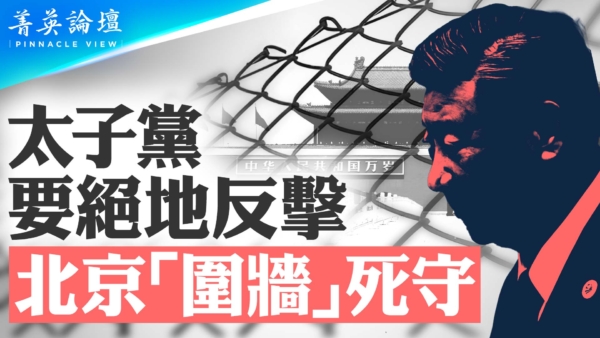【新唐人2012年8月28日讯】多年来,大陆当局建立了世界上最庞大的网络审查监控系统。根据美国“加州伯克利大学”网站的相关研究,仅“新浪微博”,平均每天就有3个以上的“新敏感词”被列入黑名单。这意味着,随着网络新型媒体的出现,官方审查系统和网民之间的战争不断升级,网民不断创造新词汇,使当局疲于封堵。
美国“加州伯克利大学”创办的“中国数字时代”网站,从去年(2011年)4月开始搜集被大陆新浪微博禁止搜索的“敏感词”。截至今年(2012年)8月15号,这个网站上的“新浪微博敏感词列表”共收录了1543个敏感词。也就是说,平均每天都有3.2个新的敏感词问世。
对此,“全球自由信息运动”创办人张新宇向《新唐人》表示,中共政府作为一个独裁政权,面对现代网络媒体的冲击,一定会设法进行网络封锁。
“全球自由信息运动”创办人张新宇:“它是用谎言和暴力维持政权的。它要想用谎言的话,如果不去过滤词的话,它就没办法用它的谎言。因此它是必然会去用的。”
去年5月,当中东、北非的“茉莉花革命”不断蔓延的同时,大陆当局设立“国家互联网信息办公室”这一新机构,以便对全国互联网实行更严格的管制。
前中共情报官李凤智:“现在社会形势不好了,可能这方面的力度要加大。因为网络是他们很头疼的一件事情,因为是一种高科技的、新的传媒,可以把信息想方设法的传出去,它捂是不太好捂。现在网络是它最大的一个挑战。”
新加坡《联合早报》分析说,“伯克利大学”的这个列表形象的反映出,随着互联网进入2.0时代,网民的防审查招数也进入2.0版,审查机构和网民间“审查与反审查的游戏”在不断升级。
去年4月初,微博上被屏蔽的多是“中南海”等未经修饰的词条,但渐渐的,“liusi(六四)”等拼音也被列入屏蔽范围。而今年2月王立军事件爆发后,连“王丽娟护士长(指王立军副市长)” “重庆火锅(指薄熙来)”等隐晦的“代称”也都被禁。
在反审查的抗争中,网民们不再简单使用分隔符号或拼音,将敏感词略加包装的方法,而是开始使用变化多端的“代称”形式,促使大陆微博进入“代称”时代。
在五花八门的“代称”中,有取自名字谐音的“康师傅”(指中共政治局常委周永康)、有源自当事人外貌特征的“墨镜哥”(指盲人维权人士陈光诚),也有表现地理位置与意识形态特征的“西红柿” (指重庆市唱红)等。
张新宇向记者分析指出,独裁专制政权的不断解体消失,已经成为当今世界潮流,因此中国老百姓对民主自由的要求也是与日俱增。
张新宇:“老百姓、人民的智慧在不断的增长,这也是必然的。因此对于独裁政权的统治者来讲,他们一定也是要想尽办法,来对付老百姓这种聪明程度的提高。所以它的办法就是让过滤词不断的升级。”
今年6月,“香港大学新闻及传媒研究中心”推出了一个被称为“微博视野”的项目,它能够监测“新浪微博”上被审查和删除的内容。项目的主要研究者傅景华博士认为,与其他国家相比,中国大陆的网络审查制度是“最庞大和最复杂的”。
根据国际知名的媒体监督组织“无国界记者”发表的最新年度报告,中国大陆的新闻自由度在2011年全球排名榜中继续下降,位列最底端。在总共179个国家和地区中,中国排名第174位,列全球倒数第6。
采访/刘惠 编辑/李谦 后制/王明宇
Internet Users Create More Tricks in War Against Censorship.
Creating Havoc for the Authorities.
In recent years mainland authorities have established what
believed to be, the worlds largest internet monitoring censorship.
Research carried out at University of California in Berkeley,
UCB along with ‘Sina Microblog’,
three ‘other’ case sensitive words have become
blacklisted upon the web.
This means, with the emergence of this new type of
network media,
the war is escalating between the official’s review of
the system and the netizens’ anti-censorship.
Internet users are constantly creating new words,
leaving the authorities struggling to block these off.
China Digital Times website, founded in the US at UCB,
began collecting banned search words
from Sina Microblog last April 2011.
By August 2012, a total of 1543 ‘sensitive words’ are said
to be listed upon Sina Microblogs.
Making an average 3.2 new words, deemed sensitive every day.
Founder of the Global Freedom of Information Movement,
Zhang Xinyu, commented to NTD how, as a regime, CCP is
now faced with the global threat of modern network media.
With its constant need to escalate their network and
media blockages.
Zhang Xinyu: “CCP relies on lies and violence
to maintain its regime. If it wants to use lies,
if it does not filter words, there is no way to continue
its lies. Therefore, it is bound to use filtered words.”
May of last year saw the ‘Jasmine Revolution’ spread
across the Middle East through to North Africa.
This sparked CCP in to the action of establishing a new
institution. ‘The National Internet Information Office’.
Allowing them stricter controls upon the internet nationally.
Former Chinese intelligence officer Li Fengzhi: “The social
situations are bad now; the CCP might increase the strength its network blocking.
Network is a very troublesome thing for CCP,
it is a high-tech, new media.
There are many ways to spread information through
networks.
Now network is the biggest challenge facing the CCP.”
Singapore’s ‘Lianhe Zaobao’ analyzed how the list from
University of California, Berkeley,
vividly reflected the Internets version 2.0 and
netizens anti review tricks also entering into the version 2.0 .
The game ‘review and anti-censorship’ is escalating for
review agencies and Internet users.
Early April of last year, censorship to words such as
“Zhongnanhai" began to occur upon Sino Microblog.
Gradually, Pinyin liusi(June 4th) also became blocked.
After Wang Lijun event in February of this year,
even the alluding words such as matron of Wang Lijuan (deputy mayor of Wang Lijun),
Chongqing hot pot (alluding to Bo Xilai) were also
shielded and blocked.
In protest to all anti-censorship, Internet users are no longer
simply using methods such as the delimiter or Pinyin,
nor slightly packaging sensitive words.
They’ve started to use a great variety of ‘codenamed’ phrases,
forming the mainland microblog into a ‘codenamed’ era.
In the usage of such ‘codenames’, Master Kang refers to
Politburo Standing Committee member Zhou Yongkang, as ‘Homophonic’ because of his name.
‘Sunglasses man’ refers to Blind human rights activist
Chen Guangcheng because of his physical characteristics.
‘Tomatoes’ means ‘Chongqing famous red songs’
because of the location and ideology features.
Zhang Xinyu told reporters how the authoritarian regime
continues to disintegrate and disappear,
which has become a major trend in the world today.
Therefore, the requirements of the Chinese people
for democracy and freedom are growing daily.
Zhang Xinyu: “It is inevitable how the wisdom of the Chinese
people is increasing. For the rulers of the dictatorial regime,
they must try every means to deal with the improvement
of the peoples ever growing intelligence.
One of its ways is to constantly upgrade the filtering and
blockading on the web of so called ‘sensitive’ words.”
In June of this year, the University of Hong Kong Journalism
and Media Studies Center, launched a project called ‘microblog vision’.
Its purpose is to monitor the reviewed and deleted content
on the Sina microblog.
The principal investigator of the project Fu Jinghua pointed out,
compared to other countries, mainland China’s Internet censorship is ‘the largest and most complex’.
According to the internationally renowned media monitoring
organization ‘Reporters without Borders’, recently published its latest annual report.
The global ranking chart freedom of press in mainland China
continued to decline in 2011, ranking in globally, bottom.
In all of the 179 countries and regions, China ranked 174.
It is upon a global market, ranked sixth from the bottom.


